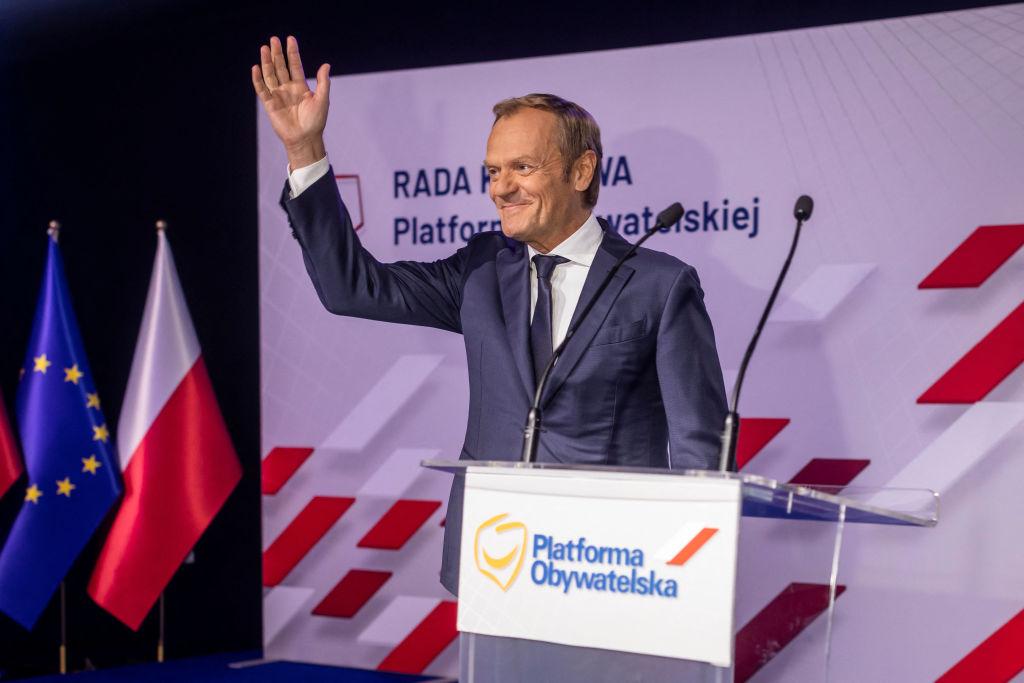
Former Polish Prime Minister Donald Tusk has come back to where he started, reclaiming his position as head of Civic Platform (PO), the party that he led to electoral victories in 2007 and 2011, before going on to serve as president of the European Council. His task now is to return Poland to Europe’s good graces.
With an overwhelming victory over Rafal Trzaskowski, the mayor of Warsaw and Poland’s most popular politician, Tusk has certainly returned with style and aplomb. But his victory has cast a shadow over a younger liberal politician who has been building his own political movement for some time.
It’s hard to believe Trzaskowski’s claim that he doesn’t want to break away and compete with PO (where he will continue to serve as deputy chair). Under its previous chair, Borys Budka, PO suffered a historic loss of support—falling to 15–20% in opinion polls—and has been overtaken by the journalist and activist Szymon Holownia’s Poland 2050 movement (which currently stands at 20–25%).
Budka assumed the position of chair because Trzaskowski originally didn’t want the job. But because Trzaskowski leads the ‘young’ generation that took over the party from Grzegorz Schetyna in January 2020, Budka’s leadership created an untenable division of labor. A party leader who doesn’t represent the most powerful bloc within his party is doomed to failure.
There are generally two career paths open to Polish politicians. If power is what you want most, you must seek to lead your party, engage in local-level politics and become prime minister (or become a puppet master like Jaroslaw Kaczynski, the de facto leader of Poland’s current government). But if you’re more interested in prestige and popularity—and especially if party politics bores you—the presidency is a more suitable aspiration; that office allows one to reign rather than rule.
Tusk (like Kaczynski) is a clear example of the first type, whereas Trzaskowski is more of a ‘presidential’ politician. While Tusk famously sneered that ‘sitting under the [presidential palace] chandelier does not interest me’, Trzaskowski once admitted that he was never so bored as when he became an opposition MP. When he had the chance to lead the party, he dismissed it. After narrowly losing the presidential election last summer, he promised to organise a ‘New Solidarity’ movement, but then failed to follow through on that project.
Now, the political situation has changed. There’s a new movement organised by Trzaskowski, but it’s emerging from the Campus Poland of the Future (a leadership school for 1,000 young people that will be held in Olsztyn this fall). Invitees include well-known intellectuals and the mayors of Prague, Budapest and other cities.
For his part, Trzaskowski wants to rely more on local government officials to mobilise support, capitalising on the fact that the opposition still governs Poland’s 100 largest cities and half its provinces. But, again, no one will be surprised if this strategy fails to lead to the establishment of a new political party.
Trzaskowski and his entourage claim to be preparing for a confrontation with Tusk, but the reality is that their interests are complementary. Because Tusk isn’t interested in the presidency, we can anticipate that he’ll promise to support Trzaskowski in pursuit of that office. Moreover, Trzaskowski surely knows that an open confrontation with Tusk is risky. After all, he still must manage Warsaw on a day-to-day basis, whereas Tusk, whose return dominated Polish media, has plenty of free time to focus on the nuts and bolts of local politicking. The former prime minister has just started a tour of Poland—and has drawn crowds.
For the past year and a half, politics has taken place mainly online, which is why Holownia has managed to gain support in polls despite his lack of party infrastructure. But when normal politics resumes after the pandemic, social media won’t be enough. In this context, it will be important to remember that no successful new party has been formed during the 20 years that Kaczynski’s Law and Justice (PiS) and PO have been the dominant forces in Polish politics.
Nurturing a new party will be just as difficult now as in the past. Since Holownia has done little to show that he can actually lead, Poles won’t know how strong a politician he is until he confronts his first crisis. That may happen soon, as Kaczynski reacts to Tusk’s presence like a bull seeing red. Whatever Holownia’s talents, he will look boyish and callow compared to Tusk.
Yet Tusk’s return is not without risk. Why would a politician who has succeeded in everything now get back into Polish politics to lead a party that has haemorrhaged support? Unlike PO’s, PiS’s position has remained strong—owing to its shameless dishonesty and recourse to populist hand-outs. Poles don’t seem to mind this dirty business. And now that even more EU money from the pandemic recovery fund is poised to flow into the country, the PiS government will have additional resources at its disposal.
The question, then, is whether Tusk can be a credible people’s politician. No other political style can win in a country that has been so deeply infected with populism. If Tusk’s seven years serving at the highest levels of EU power have made him into an incorrigible technocrat, he could go the way of former foreign minister Bronislaw Geremek, a symbol of the Polish intelligentsia who could never win more than 10–12% support in party leadership contests.
Tusk doesn’t need to mimic Kaczynski by openly snubbing elites. But he does need to demonstrate a deep, genuine commitment to working-class and rural Poles. And even that may not be enough to break PiS’s hold on power.